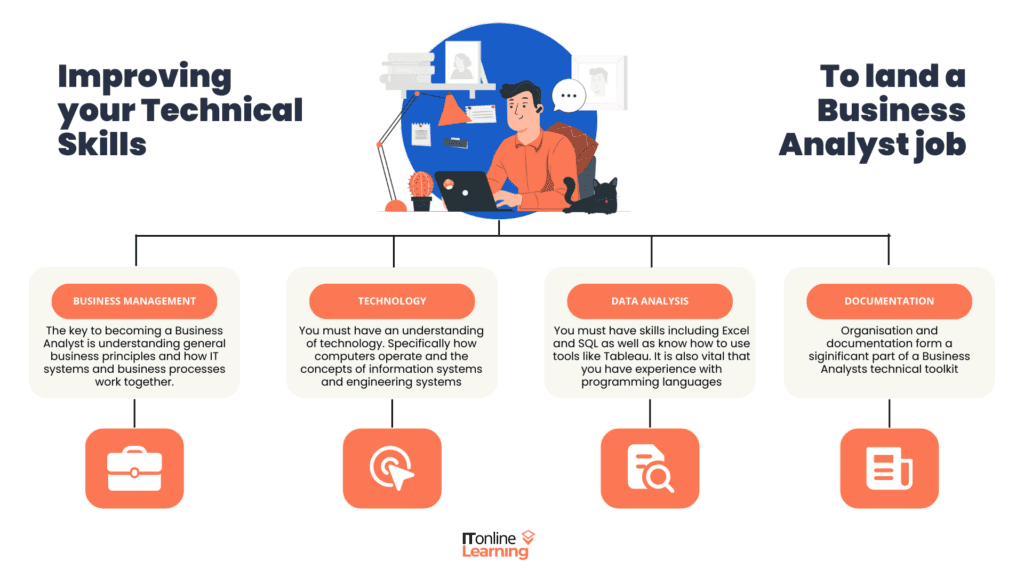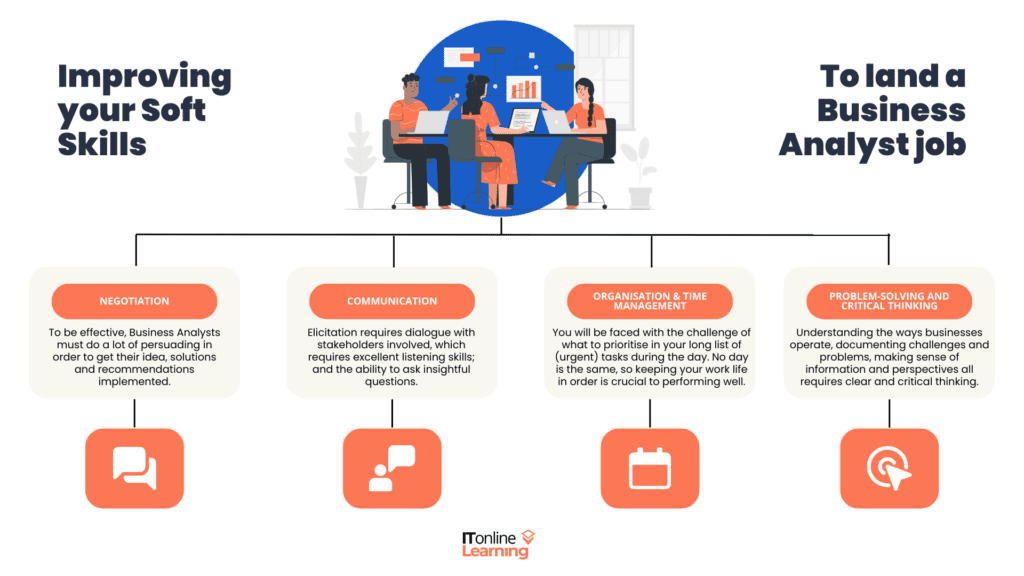Business Analysis is a career shrouded in mystery and confusion for many!
And yet, the Business Analyst career consistently ranks high as one of the fastest-growing careers in the UK.
What’s unfortunate is this confusion about the Business Analyst careers could be what’s keeping people from pursuing this career, which is not only a financially rewarding career but offers challenging work focused on solving business problems using data-driven decisions.
We want you to understand the Business Analyst career path and, more importantly, what steps you can take right now to pursue this exciting career.
By the end of this post, prepare to be less confused about Business Analysis as a career.
You will understand the importance of Business Analysis – what makes a good Business Analyst and the requirements to land a Business Analyst role. We will outline the technical and soft skills required of professionals in this field and introduce a career programme guaranteed to land you an entry-level Business Analyst role.
What Is Business Analysis and What Is the Importance of Business Analysis?
Business Analysis is the professional discipline of identifying and articulating the need for change in organisations and facilitating that change.
This is the work of Business Analysts, whose job it is to investigate business needs and recommend solutions to increase the performance of critical business operations, reduce costs, and identify inefficiencies.
Whilst Business Analysis is associated with IT (it originated as part of the IT function), it is much broader than that to encompass business systems, processes, and organisational culture.
Business Analysis is not a career for people with IT skills and backgrounds exclusively. It has evolved to include people with business backgrounds and skills in analysing and devising solutions to increase the effectiveness of organisations.
So yes, you, too, without an IT background, can become a Business Analyst by undertaking professional training and certification programmes in Business Analysis.
Standard job titles that you can find in Business Analysis include:
- Data Analyst.
- Business Consultant.
- Project Manager.
- Systems Analyst.
- Process Analyst.
- Management Consultant.
- Product Manager.
- Business Improvement Specialist.
How Modern Businesses Work
Customer expectations drive businesses to transform – this has always been the case.
Enter Business Analysts, whose role is to accelerate the necessary change that needs to happen within companies so they remain competitive in increasingly volatile markets and meet increasing customer needs.
So, with this in mind, expect the demand for skilled business analysts to continue as more organisations recognise the need for these professionals.
What is Needed to Land a Business Analyst Job?
1. Technical Skills
These are the hard skills you will need to thrive in a Business Analyst career:
Business Management
The key to becoming a Business Analyst is understanding general business principles, beginning with how IT systems and business processes work together. This extends to all other business fundamentals – including budgeting, cost-benefit analysis, organisational charts, variance analysis, and customer relations – and how they ultimately inform business strategy.
Technology
Business Analysts should have a comprehensive understanding of technology. Notably, they should understand how computers operate and the underlying concepts of information systems and engineering systems.
Understanding Microsoft Office is critical, particularly in Microsoft Excel, SharePoint, and Flowchart-maker Visio – including Perl, VBScript, and SQL.
Data Analysis
Competent data skills are a requirement for Business Analysts and are essential to becoming a Business Analyst.
General data analysis skills include Excel and SQL, using modelling and visualisation tools like Tableau. Experience with programming languages such as Python is important in a Business Analyst career.
Research is also essential – Analysts must be comfortable with all aspects of research as it applies to business management.
Part of data analysis involves writing elicitation requirements, performing object-oriented analysis, gap analysis, statistical analysis, creating risk-management projections, and financial forecasting.
Documentation
Organisation and documentation activities form part of a Business Analyst’s technical toolkit. It often involves writing business requirements documents (BRDs), projections, plans, and analysis reports based on your research.

2. Soft Skills
Business Analysts need highly developed soft skills to thrive in their field, including:
Negotiation
Business Analysts must do a lot of persuading to get their idea, solutions and recommendations implemented.
The work involves liaising with stakeholders with different interests in the project outcome. There’s also the issue of internal politics to be navigated. In this context, negotiation skills often mean convincing people with opposing objectives to embrace a larger vision.
Communication
Pretty obvious, right? Well, only sometimes.
We should distinguish the role of a Business Analyst, thinking it is mainly technical when communication is crucial to the effectiveness of a Business Analyst.
Quite the opposite: elicitation requires dialogue with stakeholders involved, excellent listening skills, and the ability to ask insightful questions.
You will also need speaking skills, whether meeting with team members, communicating needs to developers and IT, interfacing with users, or presenting to leadership and clients – communication will happen with these groups and will require a different approach. It will often require a different approach.
Organisation and time management
As a Business Analyst, you will encounter the challenge of what to prioritise in your long list of (urgent) tasks during the day. No two or three days are the same, so keeping your work life in order is a crucial first step to performing well.
Problem-solving and critical thinking
Problem-solving and critical thinking are the bread and butter of a business analyst. Understanding how businesses operate, documenting challenges and problems, making sense of information and perspectives – and ultimately, devising workable solutions – requires clear and critical thinking. This is a must to be effective as a Business Analyst.

3. Certifications
Obtaining relevant certifications that are accredited and internationally recognised is the path we recommend to becoming a Business Analyst, especially in the UK job market.
Why’s that?
UK employers value candidates with relevant Business Analysis qualifications accredited by leading accrediting bodies like the BCS. These qualifications validate your skills and place you above other candidates in the job market applying for similar roles.
These are the Certifications That we Recommend:
- Business Analysis Fundamentals. Understand the fundamentals of Business Analysis and build a strong foundation of knowledge before tackling more in-depth courses.
- BCS Foundation Certificate in Business Analysis. Understand how to identify and evaluate options for improving your organisation. Develop skills and knowledge to support successful business change programmes within your organisation.
- BCS Practitioner Certificate in Business Analysis Practice. Learn how to utilise techniques, understand the strategic context of organisations, analyse stakeholder perspectives, analyse and model business activities, identify potential solutions, and learn how to produce a business case. You must pass the official exams to move on to the next section.
- BCS Practitioner Certificate in Requirements Engineering. Learn to take a systematic approach to elicit, analyse, validate, document, and effectively manage requirements using a set of practices and processes. You must pass the official exams to move on to the next section.
- BCS Practitioner Certificate in Modelling Business Processes. After completing this course, you can apply process modelling techniques to various organisational scenarios. You must pass the official exams to move on to the next section.
We recommend you obtain these accredited qualifications as part of our Business Analysis Career Programme, where we support you with the following:
- A tutor is assigned to help you pass your exams and become qualified.
- A personalised study plan to help make studying easier.
- Revision questions and quizzes.
- Exam revision support.
What Makes a Good Business Analyst?
Business Analysts have a way with people.
What’s challenging is communicating with a wide variety of stakeholders – people with diverse backgrounds and professions – in a transparent, efficient, and pleasant way.
Also, Business Analysts have to articulate their value and, at times, persuade management to change their priorities which may be difficult.
Therefore, people skills will help you get ahead. Good writing skills also matter for written communication that is clear, concise, well-written, and free of unnecessary errors.
Business Analysts know how to listen.
Listening skills can sometimes take a backseat to written and verbal communication, which should be avoided.
Business Analysts must listen carefully to understand clients’ wants, needs, and expectations. Furthermore, active listening by nodding and maintaining eye contact will make stakeholders feel heard.
Business Analysts are analytical.
We’ve mentioned this before, but it bears repeating – analytical thinking is at the crux of what you will be doing as a Business Analyst.
You will interpret business needs and translate them into operational requirements. Critical analysis of a company’s processes, systems, and ways of working is required here, as is using analytical and human-centred approaches to arrive at a working solution.
Business Analysts are problem solvers.
Becoming a Business Analyst is also about being a competent problem solver!
Solutions to business challenges are rarely ever straightforward. Such is the case in various industries; therefore, Business Analysts must think critically and look at these situations from different angles – considering multiple scenarios and operations – before arriving at a solution that benefits the organisation.
Business Analysts have broad knowledge in a range of areas.
Business Analysts can be an expert in some things. However, it is only possible to be an expert in some things. They need a wide breadth of knowledge of several disciplines, such as business trends, new tech, and business processes. Diverse knowledge means eliciting the correct information from stakeholders and identifying business opportunities: versatile thinking and creative problem arise.
How to Become a Business Analyst – The ITonlinelearning Business Analysis Career Programme
Think of the ITonlinelearning career programme in Business Analysis as a “hold you by the hand” training and support programme that helps you become qualified in core Business Analysis courses (These are the qualifications employers expect you to have) and then assists in finding your first entry-level Business Analyst role (this is guaranteed or your money back)!
There’s more – during your training with us, we’ll assign you a specialist mentor and tutor to help guide and provide support so you complete – and pass your exams.
This placement programme focuses on helping you get qualified and get placed into the industry you want to work in as quickly as possible!
This is what makes this Business Analyst training different! It is why previous students (now working professionals) recommend it so much.
How This Career Programme Is Structured
Your journey to becoming a Business Analyst professional begins with getting BCS certified. They are a globally recognised accrediting body that validates the skills and knowledge of professional Business Analysts. Your journey will start with the following:
1. Study the Business Analysis Fundamentals course
Receive a solid introduction to Business Analysis through this fundamentals course. Gain an understanding of the concepts commonly used in Business Analysis, and start your learning with solid foundational knowledge.
2. Study the BCS Business Analysis Foundation course
Study the compulsory BCS Business Analysis Foundation course.
This course will lay the foundation for your Business Analysis knowledge by understanding how to identify and evaluate options for improving your business and developing the skills and expertise to support successful business change programmes within your organisation.
3. Study the BCS Practitioner Certificate in Business Analysis Practice
Explore a range of strategic analysis and performance management techniques used in Business Analysis. This is the third course in the Business Analysis career programme. You must pass the official exams to move on to the next section.
4. Study the BCS Practitioner Certificate in Requirements Engineering
Develop a set of practices and processes to identify requirements to develop and design business solutions. Pass the official exams to move on to the next course of this programme.
5. Study the BCS Practitioner Certificate in Modelling Business Processes
Investigate and analyse the ways your organisation carries out its operations. Pass the official exams to move on to the next course of this programme.
6. Prepare for your Oral Examination
Prepare for your oral exam by studying the course with the help of the tutor assigned to you. Book and take your oral exam once ready.
7. Receive Recruitment Support
You’ve passed all required exams. Congratulations, you are qualified in Business Analysis. Our recruitment team will now help you prepare for interviews and help you land the job you want.
Become a Business Analyst!
With ITonlinelearning’s Business Analysis career programme, NOW YOU CAN!
We are the only career programme that helps you gain the qualifications for the career you want AND also finds you an entry-level job in the sector you desire. Guaranteed or your money back!
This career programme is accredited by BCS – the Chartered Institute for IT – a professional accrediting body for IT professionals in the UK and internationally.
Our career programmes are 100% quality content, recognised and endorsed globally by practising professionals.
Interested but require financial assistance? Ask us about the option to spread your payments affordably – at a 0% interest rate – over a 6 to 12-month period with Omni Finance.







